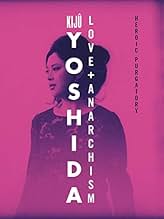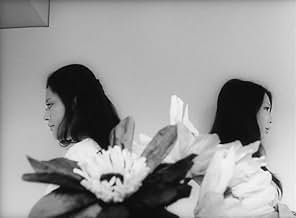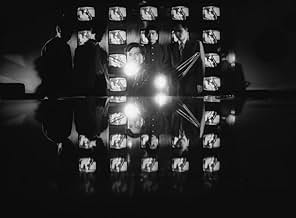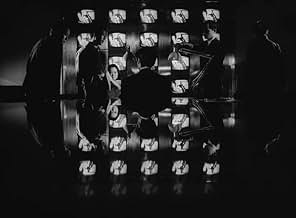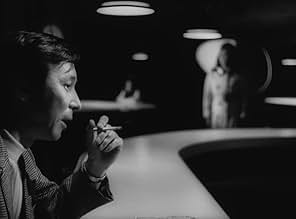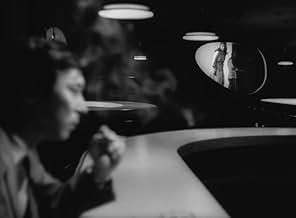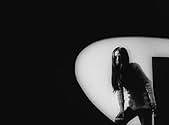La moglie di un ingegnere torna a casa con una ragazza che era perduta. Un uomo compare come il padre e cerca di riaverla, facendo che l'ingegnere ricordi la sua giovinezza come un rivoluzio... Leggi tuttoLa moglie di un ingegnere torna a casa con una ragazza che era perduta. Un uomo compare come il padre e cerca di riaverla, facendo che l'ingegnere ricordi la sua giovinezza come un rivoluzionario, tra tempo e spazio, fantasia e realtà.La moglie di un ingegnere torna a casa con una ragazza che era perduta. Un uomo compare come il padre e cerca di riaverla, facendo che l'ingegnere ricordi la sua giovinezza come un rivoluzionario, tra tempo e spazio, fantasia e realtà.
Recensioni in evidenza
Yoshida's films are luminous, ethereal creations, languid love affairs blown into abstract shape by memory and time. In the period when he studied/essayed the great Antonioni, he gave us films of simple, perhaps ponderous beauty. But with Eros+Massacre he finally unraveled. This is a companion piece to that labyrinth.
I can't imagine what it must've been to see this back in 1970 with fresh eyes, what possibilities of cinema it may have opened. Thirty years later I can see that some of the things Yoshida foresaw panned out, others didn't. But this film is a maddening enigma that stands the test of that time passed, meaning it's not simply a cultural artifact of New Wave and the time when the revolutionary spirit was believed to be a force of change, but an entire evolutionary phase of cinema, New Wave before and after.
If the movie works then as more than bold experiment, it's because these particular ephemeral struggles are abstracted, the lifetime they in turn inspire and disappoint is fragmented, past and future spinning out of original frameworks. What we get from this rearrangement is a snapshot of human beings caught into disparate planes of existence, wishing to see or connect or recognize meaning in what they do.
In a brilliant scene that takes place in the 80's, one of many flash forwards into future or imaginary time, the cast of characters is assembled in an open space to hold court. Unable to properly remember a key event, they turn to a figure perched in a high chair holding a film camera to arbitrate. This surrogate filmmaker allows them back in time.
We see how the two lovers met, we see where that love brought them. We get here a beautiful realization, that the man's greatest aspiration, who is a famous scientist, is to be a good husband to his wife. The camera looks back at Mariko Okada, standing a little back from her husband being interviewed, and we see her gracefully, stoically looking out a window. Yoshida's gentle tribute to the love of his life, his wife in real life.
We see an entire life, shared by these two people, be trapped in moral dilemmas and modern anxieties, thought to be important at the time, lifechanging, with hindsight though nothing but trivial. We see them struggle to remember or forget. Yoshida gives us here a bitter last goodbye to the spirit of '68, showing us how the romance with the social struggle grew sour. These ideas having led nowhere, our only chance for happiness is with our other half that completes us. The one romance that matters.
The film is the final moments of consciousness, memory looking back upon itself.
I can't imagine what it must've been to see this back in 1970 with fresh eyes, what possibilities of cinema it may have opened. Thirty years later I can see that some of the things Yoshida foresaw panned out, others didn't. But this film is a maddening enigma that stands the test of that time passed, meaning it's not simply a cultural artifact of New Wave and the time when the revolutionary spirit was believed to be a force of change, but an entire evolutionary phase of cinema, New Wave before and after.
If the movie works then as more than bold experiment, it's because these particular ephemeral struggles are abstracted, the lifetime they in turn inspire and disappoint is fragmented, past and future spinning out of original frameworks. What we get from this rearrangement is a snapshot of human beings caught into disparate planes of existence, wishing to see or connect or recognize meaning in what they do.
In a brilliant scene that takes place in the 80's, one of many flash forwards into future or imaginary time, the cast of characters is assembled in an open space to hold court. Unable to properly remember a key event, they turn to a figure perched in a high chair holding a film camera to arbitrate. This surrogate filmmaker allows them back in time.
We see how the two lovers met, we see where that love brought them. We get here a beautiful realization, that the man's greatest aspiration, who is a famous scientist, is to be a good husband to his wife. The camera looks back at Mariko Okada, standing a little back from her husband being interviewed, and we see her gracefully, stoically looking out a window. Yoshida's gentle tribute to the love of his life, his wife in real life.
We see an entire life, shared by these two people, be trapped in moral dilemmas and modern anxieties, thought to be important at the time, lifechanging, with hindsight though nothing but trivial. We see them struggle to remember or forget. Yoshida gives us here a bitter last goodbye to the spirit of '68, showing us how the romance with the social struggle grew sour. These ideas having led nowhere, our only chance for happiness is with our other half that completes us. The one romance that matters.
The film is the final moments of consciousness, memory looking back upon itself.
This is a very good movie, maybe even great, i enjoyed every minute, it made me search in the web for possible explanations and for sure, i am going to watch other movies of this director, in the future.
However, it's almost impossible to describe it, basically it's too enigmatic to understood it completely. But simultaneously, it was not that cryptic to made me lose my interest. There are many strange movies that annoyed me because they were more pretentious than enigmatic, playing it out like there were so many mysteries to solve, whereas, there was nothing under the surface. HEROIC PURGATORY is not like that. It constantly tease you like you are on the verge of deciphering it, even though, in the end, you're confused. But there is room for interpretation. Similar to David Lynch movies.
This reminded me more of movies based on Alain Robbe-Grillet's scripts, besides, Lynch movies are subsequent. If i had to choose a movie similar to HEROIC PURGATORY, i would say L'Immortelle (Alain Robbe-Grillet) and Paris Belongs to Us (Jacques Rivette). HP is a combination of political drama/thriller and an arthouse drama/mystery. Dream-like atmosphere, rebels, spies, identity of the characters is changing, the same person could be a martyr or a traitor. And there is a girl who claims she's the daughter of this couple (both of them are the leading characters), a girl who's not entirely sure she exists at all.
I loved this movie but it's definitely not for everyone. If you got intrigued by this description, you should watch it.
However, it's almost impossible to describe it, basically it's too enigmatic to understood it completely. But simultaneously, it was not that cryptic to made me lose my interest. There are many strange movies that annoyed me because they were more pretentious than enigmatic, playing it out like there were so many mysteries to solve, whereas, there was nothing under the surface. HEROIC PURGATORY is not like that. It constantly tease you like you are on the verge of deciphering it, even though, in the end, you're confused. But there is room for interpretation. Similar to David Lynch movies.
This reminded me more of movies based on Alain Robbe-Grillet's scripts, besides, Lynch movies are subsequent. If i had to choose a movie similar to HEROIC PURGATORY, i would say L'Immortelle (Alain Robbe-Grillet) and Paris Belongs to Us (Jacques Rivette). HP is a combination of political drama/thriller and an arthouse drama/mystery. Dream-like atmosphere, rebels, spies, identity of the characters is changing, the same person could be a martyr or a traitor. And there is a girl who claims she's the daughter of this couple (both of them are the leading characters), a girl who's not entirely sure she exists at all.
I loved this movie but it's definitely not for everyone. If you got intrigued by this description, you should watch it.
I felt much the same way about this one as I felt about the previous, more famous Yoshida film I watched last week, Eros + Massacre: it's gorgeous but maddeningly esoteric. As a result of its difficulty, I found the film fairly boring. This one is perhaps even more difficult than Eros + Massacre, but it's also 90 minutes shorter, so I'd rate them pretty much even. The film involves Communist revolutionaries in Japan, who were more or less outlawed in the country by the U.S. The film spans several time periods, including the distant future of 1980 (you can tell it's the future because of the theremin music). The main action begins in 1952, which was a turbulent year for student protests. One might just watch it for the visuals - what Yoshida does with space is absolutely astounding at times. The filmmaking often brings to mind Antononi and Resnais. But it's hard to watch it just for the visuals when you know Yoshida is trying to get at something and is so deadly serious about it.
This is a movie that was made in the late '60s, early '70s period of Japan when Japan influenced by the Hippie culture was experimenting with their own brand of Avant Garde culture that was sometimes called "Angura". This is shortened Japanese pronunciation for "Underground". As the word suggests, these were experimental non-mainstream production that explored much about free sex, and anti establishment view of the world. Rengoku Eroica was made during the period of such social movement. The director of this movie, Yoshishige Yoshida (Sometimes pronounced Kijyu Yoshida) always had Avant Garde taste to his movies. He was one of the directors that were part of movement called Nuberu bagu ( from the French nouvelle vague) or Japanese New Wave. This can be seen in movie such as Amai Yoru No Hate (1961) starring Masahiko Tsugawa. So this movie was a perfect match for the director. The movie also stars his wife Mariko Okada as the mother of the young rebellious daughter.
The core story of this movie is bit like cheap science fiction. There's would be rocket scientist, guerrillas trying to kidnap an ambassador, wife, daughter that plays disjointed story segments that takes sudden detours in topics that keeps things away from from reality.
It was escapism that had intellectual pride at its core. Youth then were running away from responsibility, but were justifying it in many philosophical smoke and mirror. If you watch this movie, you can see this clearly, as you can't pin down who's responsible for what, and everything is just a play without any reality.
This type of movie rapidly lost favor with the public after the late '60s, and Yoshida himself had to move away from making movies to making TV documentaries. What a drastic swing from non-reality to pure reality. Other directors who were part of Japanese New Wave such as Nagisa Ooshima had to go to France to continue his movie making.
Experimental, and artsy, but the movie has no substance. It's interesting to watch, but don't expect to get anything deep from this movie.
The core story of this movie is bit like cheap science fiction. There's would be rocket scientist, guerrillas trying to kidnap an ambassador, wife, daughter that plays disjointed story segments that takes sudden detours in topics that keeps things away from from reality.
It was escapism that had intellectual pride at its core. Youth then were running away from responsibility, but were justifying it in many philosophical smoke and mirror. If you watch this movie, you can see this clearly, as you can't pin down who's responsible for what, and everything is just a play without any reality.
This type of movie rapidly lost favor with the public after the late '60s, and Yoshida himself had to move away from making movies to making TV documentaries. What a drastic swing from non-reality to pure reality. Other directors who were part of Japanese New Wave such as Nagisa Ooshima had to go to France to continue his movie making.
Experimental, and artsy, but the movie has no substance. It's interesting to watch, but don't expect to get anything deep from this movie.
An engineer's wife returns home with a lost teenager. A man posing as her dad tries to get her back, causing the engineer to recall his youth as a revolutionary, obscured by dreamlike disruptions of time and space, fantasy and reality.
Although I did not care for "Eros" the way some people do, I actually liked this one a bit more. Yes, the picture is washed out and I wish it was not. But the clever angles and framing made me enjoy the film from the opening shots. It has a very science fiction feeling to it at times, and I wish it had more of that.
As part of the "radicalism trilogy", I would say this is my favorite of the three. I am not crazy about Yoshishige Yoshida, but this film at least struck a bit of a cord with me.
Although I did not care for "Eros" the way some people do, I actually liked this one a bit more. Yes, the picture is washed out and I wish it was not. But the clever angles and framing made me enjoy the film from the opening shots. It has a very science fiction feeling to it at times, and I wish it had more of that.
As part of the "radicalism trilogy", I would say this is my favorite of the three. I am not crazy about Yoshishige Yoshida, but this film at least struck a bit of a cord with me.
Lo sapevi?
- QuizThe second movie in Yoshishige Yoshida's unofficial trilogy on Japanese radicalism. The other two titles are Eros + Massacre (1969) and Kaigenrei (1973).
I più visti
Accedi per valutare e creare un elenco di titoli salvati per ottenere consigli personalizzati
- How long is Heroic Purgatory?Powered by Alexa
Dettagli
- Tempo di esecuzione1 ora 58 minuti
- Colore
- Mix di suoni
- Proporzioni
- 1.33 : 1
Contribuisci a questa pagina
Suggerisci una modifica o aggiungi i contenuti mancanti

